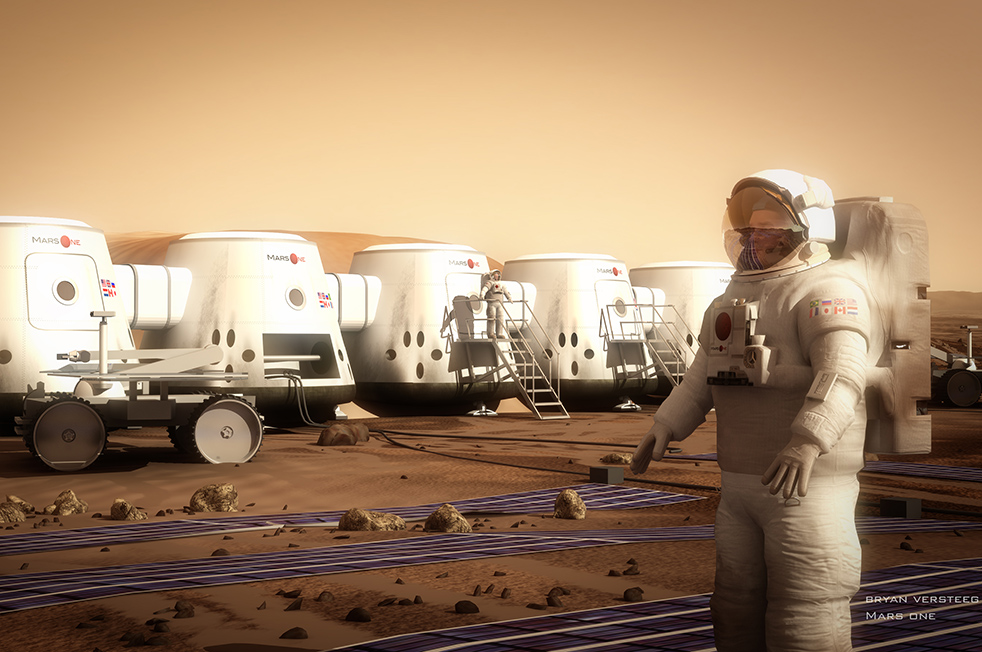A permanent human settlement on Mars sounds like the start to a new science fiction movie, but one Tech alum, Dan Carey, is on the way to making it a reality.
Dan Carey, ‘85 Applied Physics, was recently chosen out of a pool of more than 200,000 to take part in round two of Mars One’s competition to find a team to live permanently on Mars.
In 2012, Mars One, a non-profit organization led by Dutch entrepreneur Bas Lansdorp, announced its plan to establish a permanent “Mars Colony.” In 2025, Mars One hopes to send six teams of four astronauts to live on Mars.
“Mars One is looking for people to settle permanently on Mars, not just to stay briefly and then return to a normal life on Earth. And they are planning on a 10-year window before launch,” Carey said.
According to Carey, he was inspired by the idea that he could better his community—not just his local one, but also his international and universal community.
“The work we will do on Mars will be for the benefit of the whole of humanity…We will be creating a new society from scratch, determining our norms and traditions in a manner that has not been possible in terrestrial settings for hundreds of years. The engineering we will test and the processes we will develop will lay the foundations from which humankind will seed the solar system in the decades and centuries to come. I can think of no greater calling than to be one of humanity’s planetary pioneers,” Carey said.
“Plus, it’s a cool gig,” Carey joked.
The idea that humans could permanently live on Mars within the next decade is shocking to some people, but according to Carey, while their goal is a long shot, even if Mars One fails to put a colony on Mars in the next decade, other programs and institutions will surely take up the Mars colony cause.
“I hope that, should Mars One not get off the ground (see what I did there?), it doesn’t cause everyone else to sit back and decide going to Mars should be put off for another decade or two. Or three,” said Carey.
While Mars One is not quite on par with Kennedy’s famous goal to put a man on the moon, Carey still believes the commitment of the Mars One mission.
“Mars One’s roadmap is built on the premise that we already have most of the technology we need to put people on Mars and sustain them [unlike in the 1960s]. We are supplying…the will to do it, and the courage to do it permanently,” Carey added.
According to Carey, he was interested in Mars One before they even officially announced their programs. He was happy to learn they were not searching for “typical astronaut types, typical astronaut” types: test pilots and scientists with PhD’s, and such,” Carey said. Carey currently works as a ontologist, someone who studies the nature of being and existence, and as a data architecture consultant.
Compared to programs like NASA where candidates mostly hold PhDs and have military experience, Mars One searches for candidates based on personality traits.
“Their approach is to assume that intelligent candidates can be trained in the essential skills needed to establish and maintain the colony. Therefore, they are focusing on finding people with the set of personality traits needed to deal with the intense isolation from everything familiar,” Carey said.
The five key traits Mars One looks for are resiliency, adaptability, curiosity, ability to trust and resourcefulness and creativity.
“They also said they could not stress strongly enough the importance of an applicant’s capacity for self-reflection,” Carey said.
Applicants must make it through an elimination process to make it on the Mars One mission. Carey bested 99.5 percent of the competition by making it to the second round. Next are rounds three and four, which Carey labeled the “regional selection round” and the “international round,” respectively.
According to Carey, now that he has moved on to the second round, he is considering more seriously what a mission to mars will affect his current lifestyle.
“I resisted getting too emotionally invested in the idea of advancing. But since I received the news that I was one of only a thousand people to move on, I have been faced with the very real question of whether or not I am prepared to disrupt my life and the lives of my family to pursue this dream. I once saw a billboard that said, ‘There is no curse like a good opportunity.’ That’s what this feels like right now,” Carey said.
Even in the face of possible serious malfunctions that could happen on Mars, Carey is still ecstatic about the idea he could be “going to freakin’ Mars!”
